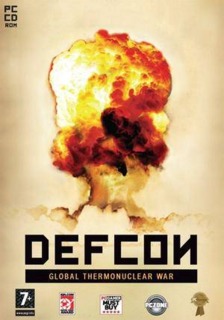DEFCON - great experience, bad game
Like the 1980s computer interfaces that inspired it, DEFCON is a game defined by its minimalism. Clean vector graphics represent units and structures with stylized flair – dotted vector exhaust trails stream behind fighter jets, fleets of neon-outlined ships do battle on darkly juxtaposing high seas. The soundtrack is made up of distant industrial rumbling and the beeping of unseen machinery; the sound builds and resonates to form a brooding, ominous tension. Just when you you’ve chewed your last fingernail to the stump from anxiety, relief comes from the punctuating blast of a nuclear detonation and the subsequent screams of the dying. Never has so much atmosphere been created with so little.
This same overall minimalism translates to the gameplay as well, creating a very approachable real-time strategy experience. Finding human opponents is as simple as clicking a single button, and when the game begins, all players start with exactly the same number of units and structures. Because there’s no resource gathering or unit building – you start the game with all your weapons ready for war – the game rewards thoughtful use of available tools over speedy reaction times or uber micromanagement. All players are locked to the same timetable, as the titular DEFCON level drops over time, from 5 to 1, with tension and hostility rising as the number lowers. At DEFCON 5, players place their structures and units – radars, missile silos, air bases, and fleets made of up various ship types. As time passes and the game reaches DEFCON 3, air and naval combat is allowed. By the time you reach DEFCON 1, the nukes are in the air.
While this simplicity makes for an engaging first experience, unfortunately the same minimalist approach that aids the overall presentation does little to mask the shallow gameplay. Once you’ve mastered sending your warheads in waves to overwhelm enemy defenses – a technique that should require no more than a game or two to perfect – you’ve already seen the most complex the game ever becomes. With our planet as the game’s only map, and six continents acting as the only playable positions, the only real strategic considerations required from game to game comes from deciding when to transform your stationary anti-air defenses into death-spewing missile silos. Honestly, there just isn’t much here, but then again actual nuclear warfare doesn’t require much thought either.
Pressing the big red button and watching the deathtoll rise, hoping to take as many lives as you can before your own population is decimated by nuclear holocaust, is a sickly engaging activity, but it quickly wears thin. DEFCON is essentially multiplayer only; the only offline option pits you against computer-controlled players with no scalable difficulty settings. Even the added paranoia stemming from lose online alliances isn’t enough to give this game the depth or longevity of any other strategy title on the market. Thankfully, DEFCON is cheap at just $15 through Steam, but even at the low price there’s barely enough meat on these bones to justify a purchase.
With a demo that virtually includes the full experience, it’s hard to recommend a game with so little to offer, especially in a genre renowned for its depth and replayability. Easily activated mods offer new visual themes and maps, but still aren’t enough to classify DEFCON as a successful game. Still, for those first couple of matches, DEFCON instills the sort of tense fear even the best in the survival horror genre can barely imitate. While DEFCON may fail as a game, it succeeds as an artistic achievement and as a social statement. As a game where there are no winners, only degrees of losers, it manages to convey a clear message entirely through gameplay, never resorting to preachy, 30-minute cinematics. From a presentation standpoint, other developers could learn a great deal from DEFCON, but for a rewarding strategy experience, you’re better off randomly selecting a game from the local bargain bin.

